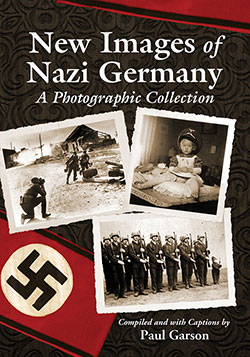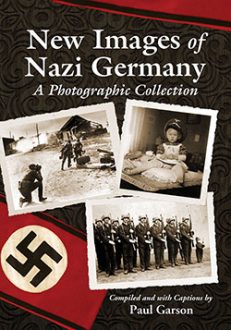New Images of Nazi Germany
A Photographic Collection
$59.95
In stock
About the Book
With its battlefields paved over and its bunkers crumbled, the Third Reich of Nazi Germany nevertheless lives on in countless photographs that record an era of extraordinary brutality. This collection of more than 500 photographs taken by amateurs and professional propagandists provides a panoramic overview of Nazi Germany, offering intimate glimpses into living rooms and killing grounds, kitchens and concentration camps, movie theaters and battle fronts. The explanatory text explores the context of the images. Together, these photographs, most never before seen, create a time capsule, capturing the faces of Hitler’s soldier’s as well as those who suffered under the Nazi onslaught on humanity.
About the Author(s)
Bibliographic Details
Compiled and with Captions by Paul Garson
Format: softcover (7 x 10)
Pages: 496
Bibliographic Info: 531 photos, bibliography, index
Copyright Date: 2012
pISBN: 978-0-7864-6966-6
eISBN: 978-0-7864-9090-5
Imprint: McFarland
Table of Contents
ACKNOWLEDGMENTS vi
PREFACE 1
INTRODUCTION: THE ROLE OF THE CAMERA 3
The Photographs
Kinder—From the Cradle to the Grave 37
Hitler Youth—Emotion over Intellect 42
RAD—The Spade Soldiers 53
Women’s Role—From Kitchen to Uniform 62
Children of the Enemy—Useless Eaters 75
The Photo as Sign of the Times—Text Messages of the Third Reich 84
Intimations of the War Within a War—Racial Terror 109
Non-Uniform Uniformity—The German Soldier 113
The Camouflage of Kultur—Art Imitates Death 142
Acting the Part—The Third Reich Entertains Itself 164
Waffen: Weapons of Fire, Blood, and Steel 202
Warhorses—The Myth of the Mechanized War . 212
Stealth Cycles—Of War 230
Iron War Horses 235
Death from Above and from Below—Flak .246
The Healing Arts—The Cured and the Inflicted 263
Essen und Trinken—Feeding the Third Reich 275
Gott mit Uns—An Ambivalent Faith 289
Arbeit Macht Frei—In Service to the Reich 295
Das Krieg—The War Begins 302
On to France—Belgian Passage 310
France—Six Weeks to Victory 314
Victims of Another Color—French Colonial Soldiers 327
The Third Reich—Axis Allies and Collaborators 335
The Great Patriotic War—The Invasion of the Soviet Union 363
Carnage Incarnate—Death Seen Through the German Camera 380
The Holocaust by Bullets—Prelude to Institutionalized Murder 397
The Tide of Defeat Turns Red—The Third Reich Reels in Reverse 408
Heldentod—Cult of Death 420
Post-Mortem—Revelations, Retributions and Revisions 428
Aftermath—Cover-Up and Revenge Revealed? 457
ADDENDA: THE EYE OF THE BEHOLDERS—CAMERAS IN USE DURING THE THIRD REICH 473
BIBLIOGRAPHY 481
INDEX 485
Book Reviews & Awards
“valuable contribution to the history of photography under the Third Reich”—The NYMAS Review; “a valuable contribution to the history of photography under the Third Reich”—StrategyPage.com; “Paul Garson has compiled an endlessly fascinating book that contains hundreds of images, most published for the very first time. Be engrossed, be enthralled, be revolted by them but don’t look away. They are too important to ignore”—Flint Whitlock, Editor, WWII Quarterly; “Paul Garson’s New Images of Nazi Germany provides a vivid and sometimes shocking portrait of the Third Reich, from mundane scenes of everyday life experiences enjoyed by German families to important photographic evidence about mass murder of the European Jewish population. This important book will make one both feel and think about the nature and actions of National Socialist Germany in a way that is both disturbing and exasperating, but nonetheless of great importance”—Eric Johnson, Central Michigan University.





